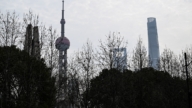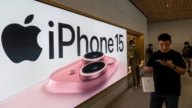【新唐人2014年06月16日讯】6月12号,中共国家外汇管理局宣布,中国外汇储备基本上达到了4万亿美元。这一消息,再次引发了媒体和经济学家批评中共囤积的外汇,不但没有给中国带来好处,反而导致大量印制钞票对冲,而引发通货膨胀等诸多弊端。那么什么原因导致外汇储备引发的问题反而超过受益呢﹖我们来看看专家的分析。
6月12号,中共国家外汇管理局,总经济师黄国波和国际收支司司长管涛透露,截至今年3月末,中国外汇储备余额为3万9500亿美元,基本达到了4万亿美元。
黄国波说,外汇储备过快增长带来了一系列挑战。外汇储备规模过大,一方面增大了本币供应,形成国内通货膨胀潜在压力,另一方面也提高了央行存款准备金率和对冲操作压力,对货币政策的制约程度进一步增加。
中共成立专门经营管理外汇储备的机构20年来,外汇储备规模增长了78倍。在此之前,中共国务院总理李克强在非洲访问期间提到,较多的外汇储备已经是很大的负担。
台湾中华经济研究院教授吴惠林:“你多余的钱没去买现成的东西,就会形成金融资产的泡沫,这个泡沫不管是通货膨胀还是资产增长,或者说这种泡沫经济到最后都会垮掉。”
中国金融智库研究员巩胜利:“外汇是用人民币换回来的,那换了以后就扩大人民币的发行量,把美元堆在那里,其实是严重的资源、货币、资本极大的一种浪费,现在人民币的发行量接近120万亿。”
据中共官媒报导,去年的国民生产总值是63亿。也就是说人民币的发行,是国民生产总值的两倍。
另外,大量的外汇储备不仅带来通货膨胀,面临的挑战还体现在增加中共央行的资产负债风险,和加大外汇储备的经营难度上。黄国波说,目前中共的外汇储备占中共央行总资产的比重,已经超过80%,因为与央行资产负债货币结构不匹配,带来了很大汇率风险和成本对冲压力。
巩胜利:“人民银行是没有任何诚信的,它只是一个傀儡,要报到中共中央的常委会讨论了以后才能决定实施与否,所以它这个体制是非常非常麻烦的,放开了以后,等于共产党就管不了了,不放开,能决策的是不懂人民币运行的,而懂的他又没有决定权,只有建议的权利。它不是考虑国家怎么样,只考虑现在的执政党。”
中国金融智库研究员巩胜利透露,中国的货币运行由中共常委决定后,再由国务院实施,然后再由各个部、委、办,把钱分发铁路和省委等不同部门,货币的发行、运用及外汇储存多少,与人民银行本身没有任何关系。
不过世界上其它国家不是这样,例如美国,美联储制定货币政策,管理所有的货币、国债则由财政部发行管理,任何政府部门和政党都不能干涉。
曾经有专家建议,多余的外汇储备可以用来解决养老、医疗等资金短缺问题。巩胜利指出,货币不流通等于废纸。
巩胜利:“国家对外汇管制得特别严厉,作为第一货币的美元,只能单向面流进来,没有自由进出的机制,所有的美元市场不准流通,都进入银行体系,它就越堆越多,这样堆下去,不仅没有利润,也没有理财的所谓财富增值,甚至中国的老百姓也没有办法享受。”
而巨额外汇储备,导致大规模投资会面临约束,如果国际金融危机爆发,还会引发资产安全和价格风险;同时也存在政治、外交冲突引发资产冻结等极端风险。
采访编辑/刘惠 后制/萧宇
China’s 4-trillion Dollar Foreign Reserves
Is a Big Problem, Say Experts.
On June 12, the Chinese Communist Party (CCP) announced
China’s foreign reserves have risen to nearly 4 trillion dollars.
The news was commented on by many media and economists,
who again criticized the CCP’s foreign reserves policies.
They said piling up foreign reserves is little benefit to China,
but means massive money-printing and serious inflation.
Why do the CCP’s foreign reserves bring more problems
than advantages?
Let’s look at the following analysis from financial experts.
On June 12, State Administration of Foreign Exchange chief
economist Huang Guobo and head of the international
payments department Guan Tao revealed that, by March 2014
China’s foreign reserves totaled 3.95 trillion dollars.
Huang Guobo said, an excessive rise of foreign reserves
has brought a series of challenges;
First, it increases the need of money supply which
potentially causes inflation;
Secondly, it increases the cash reserve ratio of the central
bank, making hedging operations more difficult.
Lastly it places more restriction on monetary policies.
The CCP set up its administrative office for foreign reserves
management 20 years ago.
Since then, its foreign reserves have increased 78 times.
In his last visit to Africa, CCP premier Li Keqiang mentioned
that foreign reserves had become a big burden to the state.
Wu Huilin, Professor of Chung-Hua Institution for Economic
Research ”As long as the extra money is not used to make
purchases, the financial bubbles will be there. The bubbles
will definitely burst.
Inflation, capital growth or the bubble economy we are talking
about will all collapse in the end.”
Gong Shengli, Chinese financial think tank researcher
”Foreign reserves have to be exchanged with Chinese Yuan.
So creating tremendous foreign reserves requires increasing
monetary supply, a big waste of capital resources.
Currently China’s money supply is close to 120 trillion
Yuan ($19.3 trillion).”
According to CCP media reports China’s 2013 GDP is
63 trillion Yuan ($10.1 trillion).
So the amount of money being printed is twice
the state’s annual GDP.
So, besides inflation, massive foreign reserves also bring
higher liability risks for the central bank,.
The central bank also has more difficulty in
managing those foreign reserves.
Huang Guobo said the CCP’s current foreign reserves total
over 80% of the central bank’s total assets.
The ratio is not compatible with the central bank’s debt
structure, meaning exchange rate risk and hedging pressure.
Gong Shengli ”The People’s Bank is only a puppet with
no real authority.
A decision cannot be made without going through
the CCP’s Central Committee.
So the regime is intrinsically flawed. If you open everything
up the CCP will lose control over the situation.
If you don’t do that, decisions will always made by those
who do not understand monetary operations.
Knowledgeable people have no power and
can only give advice.
Most importantly, the CCP always place its own interests
over any other consideration for the country.”
Gong Shengli said, China’s monetary decisions are first made
by the Standing Politburo, and executed by the State Council.
Funds are distributed to different departments and committees,
such as the railway administration and local governments.
Decisions in money-issuing, fund-operation and foreign
reserves plan have nothing to do with the People’s Bank.
That is not the situation in other countries.
For example, the U.S. Federal Reserve is in charge of
making monetary policies and managing that money.
National debts are issued by the Treasury Department.
The whole process cannot be interfered with by any other
governmental agencies or any political parties.
Some experts have advised that additional foreign reserves
can be used to ease fund shortage in pension and health care.
Gong Shengli said, money is useless if it stays
out of circulation.
Gong Shengli ”The CCP has very strict control over
foreign reserves.
Particularly for dollars, which are only purchased in but
there is no system in China to freely pay them out.
Dollars can only flow into the bank system without
market circulation, and so just pile up day by day.
That money creates no interest and there is no wealth
management of it so Chinese people get little benefit.”
Tremendous foreign reserves also place restriction over
massive investment.
Once financial crisis breaks out globally, it can lead to
further risks in asset safety and price.
There are also extreme risks of asset freezing due to
political or diplomatic conflicts.
Interview & Edit/Liuhui Post-Production/Xiaoyu




























